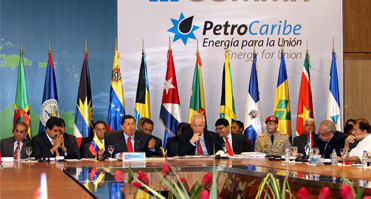The Associated Press reports on comments made by Senator Arlen Specter (R-PA) yesterday while speaking with journalists on a wide range of topics. The republican senator said he hopes to meet with Venezuelan President Hugo Chavez and Cuban President Raul Castro during a trip to Latin America later in August. “I’m a firm believer in dialogue,” he told reporters. Also in Pennsylvania, Golden Valley Farms Commodity Group will market the “Cafe Venezuela” coffee program, launched at a local Citgo gas station in Philadelphia earlier this week. About 50 metric tons is being imported from Venezuelan cooperatives for the program’s initial phase and could expand to as much as 200 tons.

In international news, Bolivian President Evo Morales announced Wednesday that his country will increase its natural gas reserves by 10 trillion cubic feet with the help of Venezuela’s state run oil company, PDVSA. Director Eulogio Del Pino Much of the equipment needed to look for gas and oil, such as exploration rigs and other technology, will be provided by Venezuela. “We need tools to look for oil (and natural gas), like farmers need tools to work the land … like picks and shovels,” said Morales, a former farmer, before a packed crowd in a Bolivian village. (Pictured here: Bolivia’s President Evo Morales and PDVSA Director Eulogio Del Pino attend the ceremony in Patacamaya.)
A new fund created yesterday by Venezuela and 18 Central American and Caribbean countries could provide as much as $400 to $500 million annually for agricultural development in poor countries, reports the Associated Press. The regional food fund known as Petro Food will begin by receiving donations from Venezuela. For every barrel of oil sold above $100, Venezuela will donate $0.05 to the fund. In related news, the DOHA Round, designed to facilitate rules and agreements for opening world markets for agricultural and manufactured goods as well as cross-border services, remains at a standstill. Some developed countries, however, are hoping to use agreements made with selective members in future talks. The Venezuelan government opposed this yesterday and stated that any arrangements made should not be taken into account, “as they were not dealt with or approved by all of the members, and do not fully reflect the interests of the developing countries.”






 Venezuela and Russia agreed to coordinate energy policy today after a
Venezuela and Russia agreed to coordinate energy policy today after a  Houston, Texas celebrated Citgo’s donation of energy-efficient light bulbs to low-income families yesterday, the
Houston, Texas celebrated Citgo’s donation of energy-efficient light bulbs to low-income families yesterday, the